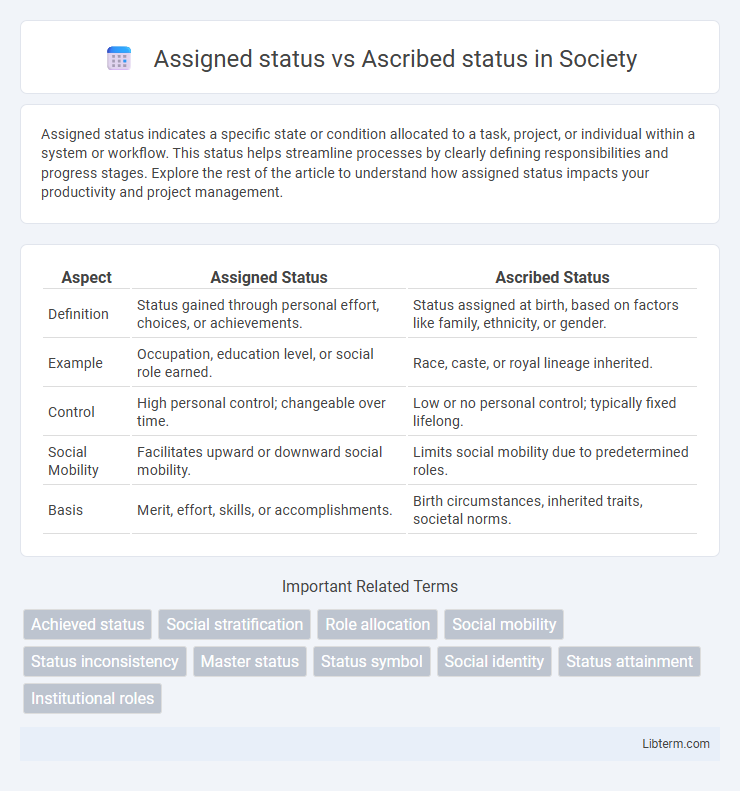Assigned status indicates a specific state or condition allocated to a task, project, or individual within a system or workflow. This status helps streamline processes by clearly defining responsibilities and progress stages. Explore the rest of the article to understand how assigned status impacts your productivity and project management.
Table of Comparison
| Aspect | Assigned Status | Ascribed Status |
|---|---|---|
| Definition | Status gained through personal effort, choices, or achievements. | Status assigned at birth, based on factors like family, ethnicity, or gender. |
| Example | Occupation, education level, or social role earned. | Race, caste, or royal lineage inherited. |
| Control | High personal control; changeable over time. | Low or no personal control; typically fixed lifelong. |
| Social Mobility | Facilitates upward or downward social mobility. | Limits social mobility due to predetermined roles. |
| Basis | Merit, effort, skills, or accomplishments. | Birth circumstances, inherited traits, societal norms. |
Understanding Assigned Status and Ascribed Status
Assigned status refers to the social position an individual occupies based on personal achievements, skills, or choices, highlighting meritocratic factors. Ascribed status, in contrast, is determined at birth or involuntarily and includes attributes such as race, gender, ethnicity, and family background. Understanding these statuses helps in analyzing social dynamics, as assigned status can be altered through effort, while ascribed status often influences opportunities and social expectations.
Definitions: Clarifying Key Sociological Terms
Assigned status refers to a social position an individual occupies based on characteristics such as race, ethnicity, or family background, which are typically fixed and involuntary. Ascribed status denotes a social identity given at birth or assumed involuntarily, encompassing factors like age, gender, or social class. Understanding these key sociological terms highlights how social structures influence individual identity and social roles without personal choice.
Historical Development of Status Concepts
The historical development of status concepts reveals that assigned status, determined by merit or individual achievement, emerged prominently during the rise of industrial societies, contrasting with ascribed status rooted in traditional, kin-based social structures such as caste or lineage. Sociologists like Max Weber and Kingsley Davis highlighted how modern societies emphasize achieved status as a measure of social mobility, whereas ascribed status dominated pre-industrial societies, limiting social change. The evolution from ascribed to assigned status reflects broader shifts in economic organization, political power, and social stratification, shaping contemporary understandings of identity and role within social systems.
Key Differences Between Assigned and Ascribed Status
Assigned status is a social position given based on an individual's achievements, skills, or actions, reflecting personal effort and choice. Ascribed status is inherited at birth or assigned involuntarily by society, typically associated with characteristics like race, gender, ethnicity, or family background. The key difference lies in assignation--assigned status is earned and changeable, whereas ascribed status is fixed and predetermined.
Examples of Assigned Status in Modern Society
Assigned status in modern society refers to positions individuals occupy based on characteristics beyond their control, such as age, gender, or ethnicity. Examples include a person being a minor, which restricts legal rights, or holding citizenship status that determines access to social services and voting rights. Another instance is the social role assigned at birth, like ethnicity influencing cultural identity and community belonging.
Examples of Ascribed Status Across Cultures
Ascribed status refers to social positions assigned at birth or involuntarily, such as race, ethnicity, gender, or family heritage, which significantly influence an individual's social identity and opportunities. In India, caste membership often determines social hierarchy; in Japan, gender roles traditionally confine men and women to specific societal expectations; and in many African societies, ethnic group affiliation can shape social status and community roles. These examples highlight how ascribed status transcends individual choice and affects social dynamics in diverse cultural contexts.
The Role of Social Institutions in Status Assignment
Social institutions such as family, education, and government play a crucial role in the assignment of both ascribed and assigned status within societies. Ascribed status, determined by factors like race, ethnicity, and family background, is often institutionalized through laws and cultural norms that limit or enable social roles. Assigned status, acquired through personal achievements, education, and professional credentials, is facilitated by institutions that provide opportunities for social mobility and recognition based on merit.
Impact on Social Mobility and Opportunity
Assigned status is determined by factors such as race, gender, or family background, limiting social mobility due to entrenched societal structures that restrict access to opportunities. Ascribed status often results in rigid social hierarchies where individuals have less control over their economic advancement and educational access. In contrast, achieved status based on personal accomplishments can provide greater social mobility and expanded opportunities for economic and social growth.
Challenges and Controversies Surrounding Social Status
Assigned status and ascribed status often fuel challenges in social mobility and equality, as ascribed status is determined by birth characteristics like race, gender, or family background, limiting individuals' opportunities to change their social positions. Assigned status, which is earned through personal achievements such as education or occupation, can create controversies when societal structures disproportionately privilege ascribed traits, reinforcing systemic inequalities. Debates arise over fairness and discrimination, highlighting how rigid adherence to ascribed status challenges meritocratic ideals and perpetuates social stratification.
Future Perspectives on Status in a Changing World
Assigned status is designated by societal structures such as caste, ethnicity, or family background, whereas ascribed status is inherited without regard to individual merit. Future perspectives on status emphasize the growing influence of achieved status based on personal accomplishments, skills, and social mobility, reflecting dynamic shifts in global economies and cultures. Technological advancements and increasing social equality advocate for meritocratic systems that challenge traditional ascriptive hierarchies, fostering more inclusive and fluid social stratifications.
Assigned status Infographic

 libterm.com
libterm.com